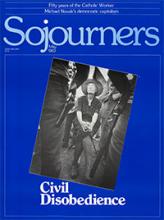In April, 1963, Dr. Martin Luther King, Jr. was imprisoned for eight days as a result of his role in the Birmingham, Alabama civil rights campaign. During that time King wrote the "Letter from Birmingham Jail," which is excerpted below. The letter was in response to a group of white Alabama clergy who had issued a statement claiming to recognize the justice of King's cause, but saying that methods such as civil disobedience and direct action were counterproductive and wrong. --The Editors
In any nonviolent campaign there are four basic steps: collection of the facts to determine whether injustices exist; negotiation; self-purification; and direct action. We have gone through all these steps in Birmingham. There can be no gainsaying the fact that racial injustice engulfs this community. Birmingham is probably the most thoroughly segregated city in the United States. Its ugly record of brutality is widely known. Negroes have experienced grossly unjust treatment in the courts. There have been more unsolved bombings of Negro homes and churches in Birmingham than in any other city in the nation. These are the hard, brutal facts of the case. On the basis of these conditions, Negro leaders sought to negotiate with the city fathers. But the latter consistently refused to engage in good-faith negotiation.
...We had no alternative except to prepare for direct action, whereby we would present our very bodies as a means of laying our case before the conscience of the local and the national community. Mindful of the difficulties involved, we decided to undertake a process of self-purification. We began a series of workshops on nonviolence, and we repeatedly asked ourselves: "Are you able to accept blows without retaliating?" "Are you able to endure the ordeal of jail?"....
Read the Full Article

